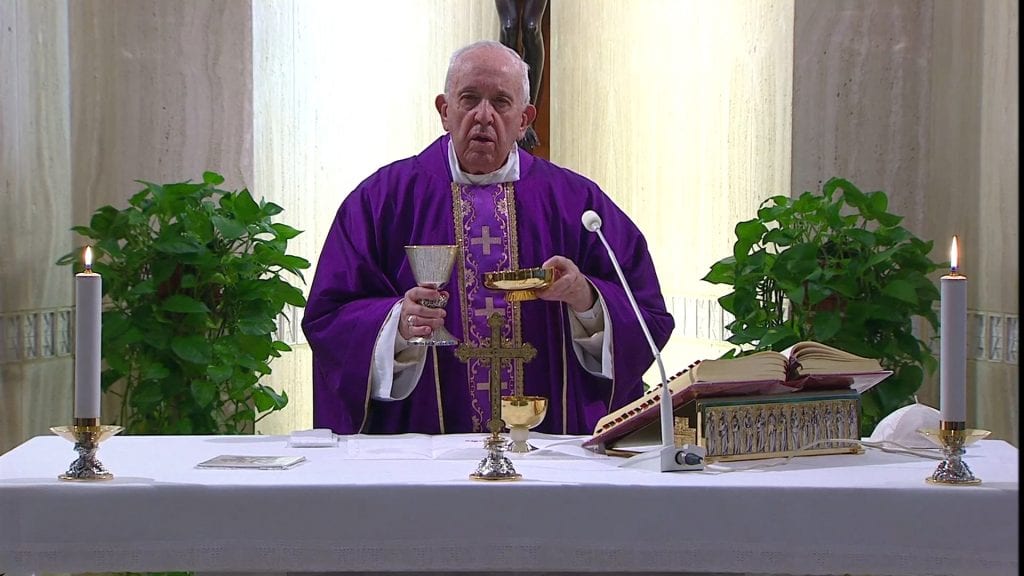Pope Francis offered his daily Mass on yesterday for families who must adjust to life with everyone at home, that they may stay peaceful and joyful during the coronavirus pandemic.
“We continue to pray for sick people in this pandemic,” the pope said before the start of Mass yesterday, adding that he would also like to say a special prayer for families.
“Families, who from one day to the next find themselves with children at home because the schools are closed for safety, and who must manage a difficult situation and manage it well, with peace and also with joy,” he explained.
Francis also said he was thinking in a special way of families who have members with disabilities, noting that many day centers for people with disabilities are currently closed.
“Let us pray for families, so that they do not lose peace at this moment and are able to carry the whole family forward with fortitude and joy,” he said.
The pope’s morning Mass in the chapel of the Vatican’s Casa Santa Marta guesthouse is being live-streamed every day during the coronavirus pandemic.
The outbreak of the virus around the world has resulted in schools closing and many people working from home or staying at home to help slow contagion. In some countries, like in Italy, people are under a forced quarantine and required to stay home except for select necessary reasons.
In his homily, Pope Francis reflected on the day’s Gospel: The parable of the prodigal son.
Francis noted the framing of the parable: that it begins with Jesus being approached by tax collectors and sinners who want to listen to him, but “the Pharisees and scribes were murmuring saying ‘he welcomes sinners and eats with them,’” the pope said.
This parable is Jesus’ response to their criticisms, Francis said, explaining that people were approaching Jesus because they felt their need for salvation, but they lacked “a guide, a shepherd.”
“And people approach Jesus because they see a shepherd in him.”
He said the Pharisees, on the other hand, feel like they can do everything on their own: “We went to university, I did a doctorate, no, two doctorates. I know well, well, well what the law says; indeed, I know all, all, all the explanations, all the cases…”
“They feel sufficient and they despise people, they despise sinners,” he added, noting that in the parable the same thing happens.
The first son asks his father for his share of the inheritance and leaves. And the father says nothing. But when the son returns, penitent, the second son accuses the father of being unjust for welcoming him back.
According to the Gospel, the older son was “angry,” Francis said. “And often, being outraged, often it is the only way for those people [pharisees] to feel worthy.”
He explained that the problem, however, is that the older son did not realise what it meant to live at home: “He did his duties, he did his job, but he didn’t understand what it is to have a loving relationship with the father.”
Pope Francis recalled a story he once heard from a “wise old priest,” about a young priest who was very sure of himself.
The older priest said he prayed the Lord would let the young man slip on a banana peel, the pope said. “As if to say – it seems like blasphemy – [that it] will do him good to sin because he will need to ask for forgiveness and will find the Father.”
With the parable of the prodigal son, the Lord has many things to say about those who criticized him for being with sinners, Francis said.
“But even today many people criticise, Church people [criticise] those who approach people in need, humble people, people who work, even those who work for us,” he said.
“May the Lord give us the grace to understand what the problem is. The problem is living at home but not feeling at home because there is no relationship of fatherhood, of brotherhood, there is only the relationship of work colleagues.”

